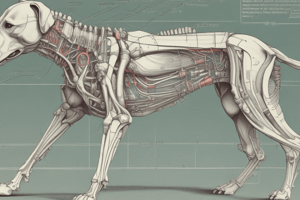Podcast
Questions and Answers
What is the function of the Masseter muscle?
What is the function of the Masseter muscle?
- Causes abduction of the leg
- Closes the jaw (correct)
- Flexes the elbow joint
- Extends the hip joint
What does the Brachiocephalic muscle pertain to?
What does the Brachiocephalic muscle pertain to?
- Upper arm and head (correct)
- Thigh and leg
- Back and shoulder
- Chest
What is the primary role of the Latissimus dorsi muscle?
What is the primary role of the Latissimus dorsi muscle?
- Flexes the shoulder joint (correct)
- Moves ribs for breathing
- Extends the hip joint
- Compresses abdominal wall
What shape does the Trapezius muscle resemble?
What shape does the Trapezius muscle resemble?
Which muscle supports digestive and reproductive organs?
Which muscle supports digestive and reproductive organs?
What is the primary function of the Gluteals muscle?
What is the primary function of the Gluteals muscle?
Which muscle group is responsible for extending the stifle?
Which muscle group is responsible for extending the stifle?
What is the function of the Semitendinosus muscle?
What is the function of the Semitendinosus muscle?
What is the Gastrocnemius muscle commonly known as?
What is the Gastrocnemius muscle commonly known as?
Which function corresponds to the Biceps femoris muscle?
Which function corresponds to the Biceps femoris muscle?
What is the function of the Intercostal muscles?
What is the function of the Intercostal muscles?
What is the purpose of the Pectoral muscles?
What is the purpose of the Pectoral muscles?
What does the Deltoid muscle primarily do?
What does the Deltoid muscle primarily do?
What is the main function of the Triceps brachii muscle?
What is the main function of the Triceps brachii muscle?
What does the Biceps brachii muscle do?
What does the Biceps brachii muscle do?
What is the largest muscle attaching the front legs to the body?
What is the largest muscle attaching the front legs to the body?
Flashcards are hidden until you start studying
Study Notes
Major Muscles of the Canine Body
-
Masseter: Key muscle in the cheek area responsible for closing the jaw, essential for chewing.
-
Brachiocephalic: Muscle connecting the upper arm and head; facilitates the extension of the head and neck while pulling the thoracic limb forward.
-
Latissimus dorsi: Long, superficial dorsal muscle; attaches the humerus to the lumbar region, playing a crucial role in shoulder joint flexion.
-
Trapezius: Triangular shoulder muscle primarily involved in neck extension.
-
External abdominal oblique: Large flat muscles supporting digestive and reproductive organs; compresses abdominal wall and aids in lateral trunk rotation.
-
Gluteals: Prominent muscles of the upper hindquarters (buttocks); crucial for hip joint extension.
-
Quadriceps femoris: Large muscle group located on the front of the thigh; primarily responsible for extending the stifle (knee).
-
Semitendinosus: Part of the hamstring group; functions in extending the thigh and flexing the leg.
-
Gastrocnemius: Calf muscle that extends the hock (ankle) and helps in toe pointing; resembles the shape of the stomach.
-
Biceps femoris: Lateral superficial muscle of the hamstring group; contributes to hip extension and stifle flexion.
-
Intercostal: Muscles located between the ribs; facilitate rib movement during breathing.
-
Pectoral: Major chest muscles involved in the adduction of the thoracic limb, playing a vital role in fore limb movement.
-
Deltoid: Shoulder muscle causing leg abduction and flexion of the shoulder joint; named for its resemblance to the Greek letter 'delta' Δ.
-
Triceps brachii: Extends the elbow joint during contraction, crucial for straightening the arm.
-
Biceps brachii: Muscle responsible for flexing the elbow joint, allowing the arm to bend.
-
Serratus ventralis: Significant muscle connecting the front legs to the body; vital for attaching the forelimb to the trunk, enhancing mobility.
Studying That Suits You
Use AI to generate personalized quizzes and flashcards to suit your learning preferences.



